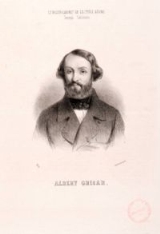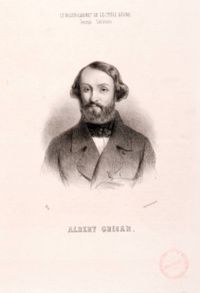
Albert Grisar
Encyclopedia

Belgium
Belgium , officially the Kingdom of Belgium, is a federal state in Western Europe. It is a founding member of the European Union and hosts the EU's headquarters, and those of several other major international organisations such as NATO.Belgium is also a member of, or affiliated to, many...
composer.
Grisar studied in Antwerp, in Paris
Paris
Paris is the capital and largest city in France, situated on the river Seine, in northern France, at the heart of the Île-de-France region...
(under Anton Reicha
Anton Reicha
Anton Reicha was a Czech-born, later naturalized French composer. A contemporary and lifelong friend of Beethoven, Reicha is now best remembered for his substantial early contribution to the wind quintet literature and his role as a teacher – his pupils included Franz Liszt and Hector Berlioz...
), and, in the mid-1840s, in Naples
Naples
Naples is a city in Southern Italy, situated on the country's west coast by the Gulf of Naples. Lying between two notable volcanic regions, Mount Vesuvius and the Phlegraean Fields, it is the capital of the region of Campania and of the province of Naples...
with Saverio Mercadante
Saverio Mercadante
Giuseppe Saverio Raffaele Mercadante was an Italian composer, particularly of operas. While Mercadante may not have retained the international celebrity of Gaetano Donizetti or Gioachino Rossini beyond his own lifetime, he composed as impressive a number of works as either; and his development of...
. He was a successful comic opera
Comic opera
Comic opera denotes a sung dramatic work of a light or comic nature, usually with a happy ending.Forms of comic opera first developed in late 17th-century Italy. By the 1730s, a new operatic genre, opera buffa, emerged as an alternative to opera seria...
composer, first winning success in Brussels
Brussels
Brussels , officially the Brussels Region or Brussels-Capital Region , is the capital of Belgium and the de facto capital of the European Union...
in 1833 and in Paris later in the decade. He collaborated with Flotow on L'eau merveilleuse (1839) and with François Adrien Boieldieu on L'opéra à la cour (1840). His Parisian works of the late 1840s and early 1850s were particularly well-received by audiences.
Operas
- , premiere: Théâtre de la Monnaie, Brüssel 1833
- , premiere: Opéra-ComiqueOpéra-ComiqueThe Opéra-Comique is a Parisian opera company, which was founded around 1714 by some of the popular theatres of the Parisian fairs. In 1762 the company was merged with, and for a time took the name of its chief rival the Comédie-Italienne at the Hôtel de Bourgogne, and was also called the...
, Paris 1836 - , premiere: Opéra-Comique, Paris 1837
- , premiere: Théâtre de la RenaissanceThéâtre de la RenaissanceThe name Théâtre de la Renaissance has been used successively for three distinct Parisian theatre companies. The first two companies, which were short-lived enterprises in the 19th century, used the Salle Ventadour, now an office building on the Rue Méhul in the 2nd arrondissement.The current...
, Paris 1838 - , Paris 1838
- , premiere: Théâtre de la Renaissance, Paris 1839
- , Paris 1839
- , premiere: Opéra-Comique, Paris 1848
- , premiere: Opéra-Comique, Paris 1850
- , premiere: Opéra-Comique, Paris 1851
- , premiere: Opéra-Comique, Paris 1852
- , premiere: Théâtre LyriqueThéâtre LyriqueThe Théâtre Lyrique was one of four opera companies performing in Paris during the middle of the 19th century . The company was founded in 1847 as the Opéra-National by the French composer Adolphe Adam and renamed Théâtre Lyrique in 1852...
, Paris 1853 - , premiere: Opéra-Comique, Paris 1855
- , Paris 1859
- , premiere: Théâtre Lyrique, Paris 1862
- , Paris 1864
- , Paris 1865
- , 1867

